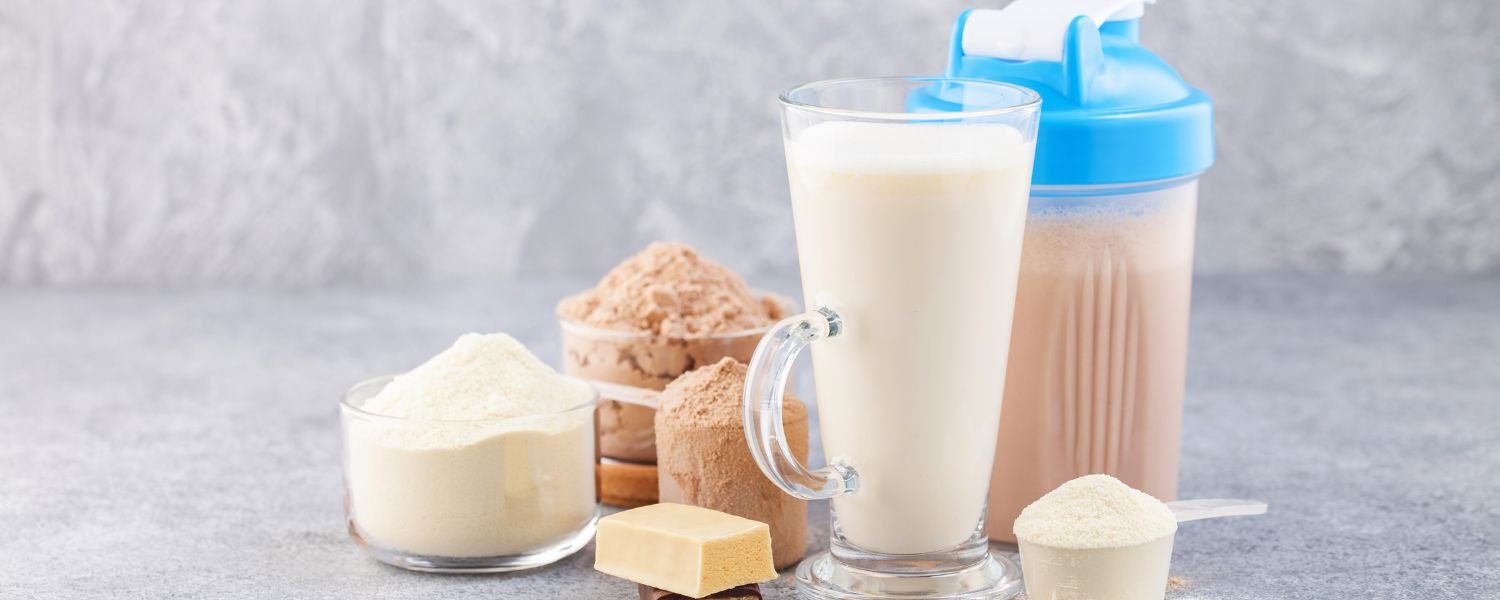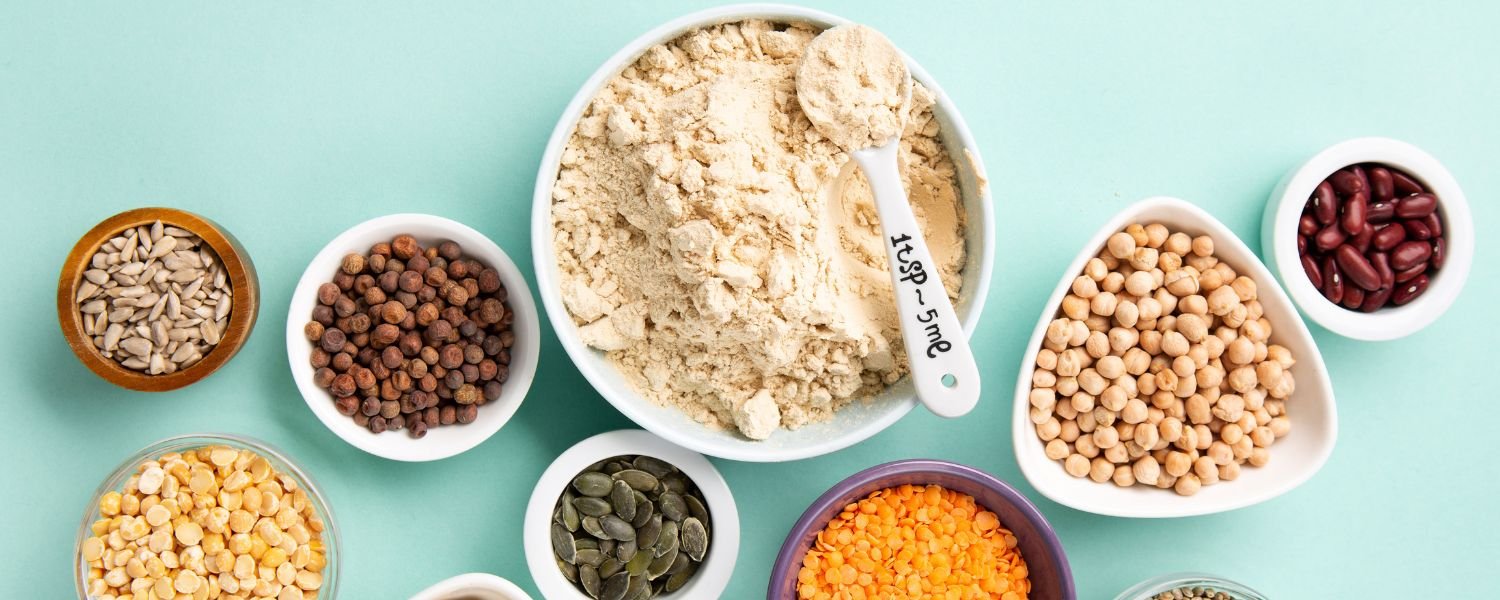Protein powder has become incredibly popular for its convenience and effectiveness in boosting protein consumption.
Whether you’re an athlete looking to enhance performance, someone aiming for weight loss, or simply seeking to meet your daily protein requirements, adding the powder to your diet can be beneficial.
However, with the many available options, it’s essential to explore the different kinds, advantages, and factors to make a well-informed decision.
What is protein powder?

Protein powder is a nutritional supplement extracted from different sources, such as whey, soy, pea, rice, hemp, or a combination of these elements.
It usually comes in a powdered form that can be mixed with water or milk or added to smoothies and recipes. The powder is packed with amino acids, which are vital for muscle repair, growth, and overall health.
What are the risks?
While protein powder offers numerous benefits, it’s essential to understand the possible risks linked to its use.
These include digestive problems like bloating, gas, and discomfort, particularly noticeable in individuals with lactose intolerance or sensitivities to specific ingredients.
Some powders may also contain additives, sweeteners, or allergens that could cause adverse reactions in susceptible individuals.
Types

Several types of protein powder are available, each with unique characteristics and benefits. The most common varieties include:
A. Whey protein: The extracted from milk, is swiftly assimilated by the body, rendering it an optimal selection for post-workout recovery.
B. Casein protein: Another protein sourced from milk, casein is known for its slow absorption rate compared to whey. This results in a gradual release of amino acids over an extended period.
C. Pea protein: Pea protein, a plant-based alternative, provides a plentiful supply of vital amino acids. This option is especially well-suited for individuals with allergies to dairy or soy.
D. Soy protein: Another plant-based option is a complete protein source that may offer additional health benefits such as lowering cholesterol levels.
E. Hemp protein: Hemp protein, sourced from hemp seeds, offers a sustainable and environmentally friendly choice.
F. Rice protein: Gluten-free and hypoallergenic, rice protein is easily digestible and suitable for individuals with dietary restrictions.
Benefits

The benefits of protein powder are extensive and encompass various aspects of health and fitness. Here’s a detailed exploration of the advantages:
1. Muscle Building
Protein powder is widely recognized for aiding muscle growth and recovery. It’s crucial for muscle protein synthesis, the body’s mechanism for repairing and building muscles post-exercise.
By furnishing a readily available reservoir of premium-grade protein, the powder helps individuals meet their increased protein requirements, especially those in resistance training or strength-building exercises.
2. Weight Management
Adding protein powder to your meals can help with weight control by making you feel fuller for longer and reducing hunger.
Protein has been shown to have a more significant satiating effect than carbohydrates or fats, helping to curb cravings and prevent overeating.
By increasing feelings of fullness, the powder can support adherence to calorie-controlled diets and facilitate weight loss or maintenance efforts.
3. Convenience
Protein powder provides a handy and transportable protein source that seamlessly blends into various meals and snacks.
The powder offers a convenient solution to boost protein intake, whether mixed with water, milk, or smoothies.
This is particularly beneficial for busy individuals with hectic schedules, providing a quick and effortless way to meet their protein needs.
4. Nutritional Support
In addition to protein, numerous protein powders are enriched with vitamins, minerals, and various other nutrients to offer comprehensive nutritional assistance.
This can be especially beneficial for individuals with dietary restrictions or those who may have difficulty meeting their nutrient needs through whole foods alone.
Protein powders can help fill nutritional gaps and ensure adequate intake of essential nutrients.
5. Muscle Recovery
Consuming protein powder after exercise can aid muscle recovery by providing amino acids to repair damaged muscle tissue.
This holds particular significance for athletes and those involved in rigorous or prolonged physical activity, as it aids in mitigating muscle soreness, expediting recovery periods, and augmenting overall performance levels.
6. Bone Health
Protein is very important in supporting muscle health and maintaining bone strength and density. Protein powder promotes bone health by supplying essential nutrients like calcium, vitamin D, and phosphorus.
This nutritional support can bolster bone strength and decrease the likelihood of osteoporosis and fractures, particularly among older adults or those susceptible to bone-related ailments.
7. Metabolism Boost
Research indicates that high-protein diets can boost metabolism and aid in fat loss. By increasing thermogenesis and calorie expenditure, protein can help enhance metabolic function and support a healthy metabolism.
8. Blood Sugar Control
Protein has a minimal effect on blood sugar levels compared to carbohydrates, making it an attractive choice for individuals to stabilize their blood sugar levels.
The powder can be incorporated into balanced meals and snacks to help regulate blood glucose levels and prevent spikes and crashes in energy.
9. Heart Health
Some research suggests that protein intake may benefit heart health, including lowering blood pressure, lowering LDL cholesterol levels, and enhancing cardiovascular function.
Individuals can support heart health by replacing less healthy protein sources with protein powder.
10. Vegetarian and Vegan Options
Plant-based protein powders offer a convenient and sustainable protein source free from animal products for individuals following vegetarian or vegan diets.
Options such as pea, soy, hemp, and rice protein provide all the essential amino acids necessary for muscle health and can help meet the protein needs of individuals following plant-based lifestyles.
Whey protein vs plant-based protein

One of the most common debates in the protein powder realm is whey protein vs plant-based protein. Whey protein, derived from milk, encompasses all nine essential amino acids, rendering it a comprehensive protein source.
Its rapid absorption by the body renders it optimal for post-workout recovery. On the other hand, plant-based proteins such as peas, soy, hemp, and rice offer a sustainable and eco-friendly alternative for vegetarians, vegans, and individuals with dairy allergies.
While they may not individually contain all essential amino acids, combining different plant-based protein sources can provide a complete amino acid profile.
How to choose the suitable protein powder

When choosing a protein powder, it’s crucial to take into account aspects like:
A. Personal dietary preferences: Choose a protein powder that aligns with your dietary choices, whether whey, plant-based, or a blend of proteins.
B. Nutritional profile: Check the nutritional label for protein content per serving, as well as additional ingredients such as sweeteners, fillers, and additives.
C. Purpose: Determine your specific goals, whether muscle building, weight loss, or general health, and select a protein powder that supports those objectives.
D. Taste and texture: Consider your taste preferences, whether you prefer flavored or unflavored protein powders, and the texture when mixed with liquids.
E. Quality and purity: Look for third-party protein powders tested for quality, purity, and safety to ensure you get a high-quality product.
1. Protein powder for muscle-building
If you aim to increase muscle mass and strength, protein powder can be a beneficial addition to aid in muscle repair, growth, and recovery.
Whey protein is often preferred due to its rapid absorption and high amino acid content, making it ideal for post-workout supplementation.
Consuming powder, a balanced diet, and regular strength training can help maximize muscle gains and improve overall athletic performance.
2. Protein powder for weight loss
High-protein diets have been demonstrated to aid in weight loss by enhancing feelings of fullness, decreasing hunger, and elevating metabolic rate.
Using protein powder can be an efficient method for managing weight, offering a convenient and low-calorie protein source that aids in curbing cravings and avoiding excessive eating.
Opt for protein powders with minimal added sugars and fats and incorporate them into balanced meals and snacks to support long-term weight loss goals.
3. Protein powder for vegetarians and vegans
Vegetarians and vegans struggle to meet their protein needs through whole food sources, making protein powder a valuable addition to their diets.
Plant-based protein powders such as pea, soy, hemp, and rice offer a complete amino acid profile and can help bridge the gap in protein intake for individuals following plant-based diets.
Look for protein powders free from animal products and sourced from sustainable, ethical sources.
4. Protein powder for athletes
Athletes have increased protein requirements due to training, recovery, and performance demands. Athletes can find protein powder convenient and efficient for fulfilling their daily requirements while aiding muscle recovery and development.
Whey protein is frequently preferred due to its quick absorption and rich amino acid profile, which makes it perfect for supplementation before and after workouts.
However, plant-based protein powders can also be suitable for athletes, providing a sustainable and eco-friendly alternative.
5. Protein powder for women
Women can benefit from protein powder supplementation to support various aspects of health, including muscle maintenance, hormone production, and weight management.
Incorporating powder into meals and snacks can help women meet their protein needs and support overall well-being.
Opt for powders low in added sugars and artificial ingredients, and choose plant-based options for additional health benefits.
6. Protein powder for elderly individuals
As individuals age, they may experience a decline in muscle mass and strength, leading to an increased risk of falls, fractures, and functional decline.
Protein powder is a beneficial supplement for seniors, aiding in maintaining muscle health, mobility, and independence.
Consider selecting powders that are easily digestible and packed with essential amino acids. Additionally, think about including resistance training belly fat exercises in your routine to optimize the advantages of using supplements.
7. Protein powder for meal replacement
Offers a convenient and nutritious alternative to regular meals, making it ideal for busy individuals or those looking to manage their calorie intake.
Blending the powder with fruits, vegetables, and healthy fats can create balanced meal replacement shakes that provide essential nutrients and support satiety.
Choose protein powders with a balanced macronutrient profile and minimal added sugars for optimal meal replacement options.
8. Protein powder for post-workout recovery
Consuming the powder after exercise is crucial for replenishing glycogen stores, repairing muscle damage, and promoting recovery and growth.
Whey protein is commonly suggested as a post-workout supplement because the body quickly absorbs it, and it contains a high concentration of amino acids.
However, plant-based options such as pea, soy, or rice protein can support muscle recovery and reduce soreness after exercise.
9. Protein powder for pre-workout energy
Some are fortified with extra ingredients such as caffeine or BCAAs (branched-chain amino acids) to enhance energy levels and enhance performance during workouts.
These pre-workout protein powders can provide a convenient energy source and focus to optimize exercise performance and intensity.
However, it’s important to choose protein powders with additional ingredients carefully and avoid consuming excessive amounts of caffeine to prevent adverse effects.
Protein powder and metabolism

Research indicates that high-protein diets can elevate metabolism and enhance calorie burning, underscoring the value of protein powder in weight loss regimens.
Eating more protein can boost thermogenesis, help control hunger, and maintain muscle mass, supporting a faster metabolism.
Incorporating protein powder into meals and snacks supports a healthy metabolism and promotes weight loss.
Effect digestive health

Although protein powder has many advantages for muscle health and weight management, some people might encounter digestive problems like bloating, gas, or discomfort after consumption.
Choose protein powders free from artificial additives, sweeteners, and allergens to improve digestive health and minimize these side effects.
Moreover, think about adding fermented foods like yogurt, kefir, and sauerkraut to your meals. These can bolster gut health and enhance digestion.
Conclusion
Protein powder serves as a flexible and accessible supplement, delivering a plethora of advantages for muscle strength, weight regulation, and general health.
Familiarizing yourself with the diverse powder options, their benefits, and the factors to consider when choosing the most appropriate variant empowers you to make informed decisions.
Whether you’re an athlete striving to boost performance, following a weight loss diets, or simply prioritizing nutrition, incorporating powder into your daily regimen can significantly contribute to your overall well-being.
For more health related blogs subscribe Us!
FAQ
Q1. How much protein powder should I consume per day?
The recommended daily protein powder intake varies depending on individual factors such as age, gender, activity level, and health goals.
As a rule of thumb, target a protein intake of 0.8 to 1.2 grams per kilogram of body weight daily. Higher amounts are advisable for athletes and those involved in vigorous physical activity.
Q2. When is the best time to consume protein powder?
You can have protein powder whenever you like, but it’s particularly advantageous when taken during exercise sessions.
Taking protein powder within 30 minutes to an hour after exercising can support muscle recovery and growth. Additionally, incorporating powder into meals and snacks throughout the day can help support satiety and muscle maintenance.
Q3. Are there any adverse effects of using protein powder?
Although it is generally considered safe for most individuals, some may encounter digestive problems such as bloating, gas, or discomfort.
This is often due to intolerances or sensitivities to certain powder ingredients. To minimize side effects, choose protein powders free from common allergens and artificial additives and ensure adequate hydration.
Q4. Can protein powder help me lose weight?
Research indicates that high-protein diets can aid in weight loss by enhancing feelings of fullness, curbing hunger, and revving up metabolism.
Adding powder to meals and snacks can also help achieve weight loss objectives by offering a convenient and low-calorie protein source.
Yet, for best outcomes, combining powder supplementation with a balanced diet and consistent exercise is crucial.

